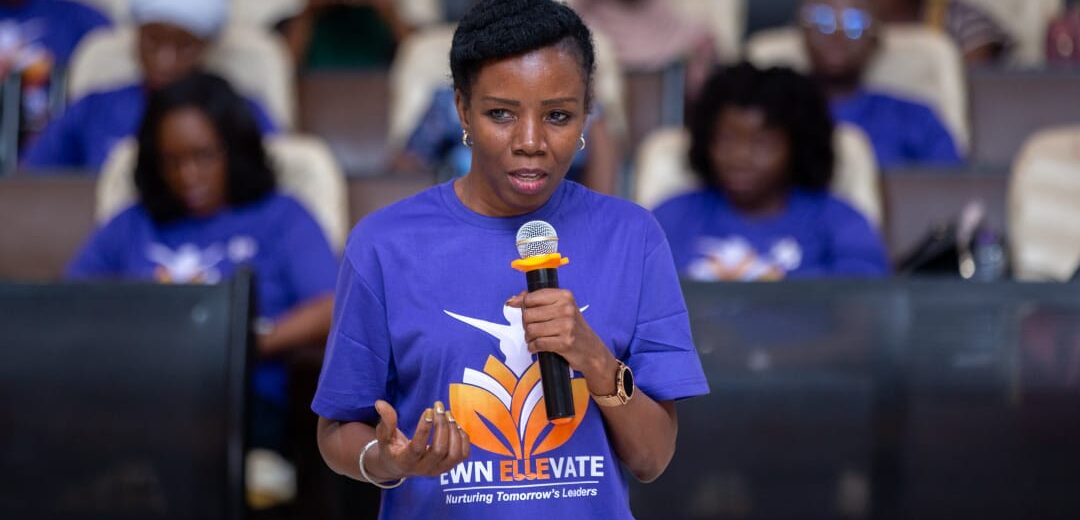
PROFESSOR EFFAH KAUFMANN; A RENOWNED GHANAIAN WOMAN SCALING UP SCIENCE
This Sunday February 11th, the world celebrates the International Day of Women and Girls in Science (IDWGIS) and for someone who is passionate about empowering women and girls in science, Vice Versa Media Ghana found the most suitable person to discuss matters of mentorship as an immense contribution to create an inclusive and diverse scientific community in Africa. To tell this story in its fullness we had a rare conversation with one of Ghana’s celebrated female scientists.
Meet Professor Elsie Akosua Biraa Effah Kaufmann, an academician, Associate Professor, and the founding head of the Department of Biomedical Engineering at the University of Ghana, Legon. She has for the past 18 years been the quiz mistress for the National Science and Math Quiz (NSMQ), an annual science and mathematics competition at the national level for senior high schools in Ghana.
She is the first woman to be appointed dean of the School of Engineering Sciences, University of Ghana, a position she has held since 1st August 2022. She is the immediate past President of the Ghana Society of Biomedical Engineers.
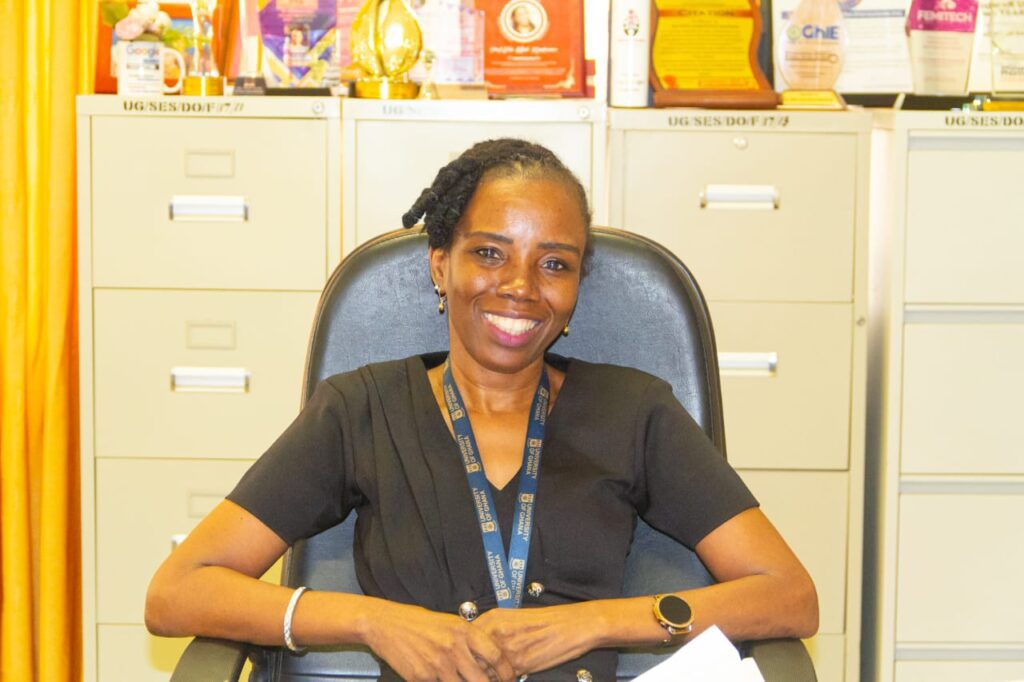
Prof. Elsie Effah Kaufmann
Prof. Effah Kaufmann was a research supervisor at the Department of Chemistry at Rutgers University in New Jersey, United States of America, from May 1998 to June 2001; after being a Teaching Assistant at the Department of Bioengineering at the University of Pennsylvania, United States of America. Prof. Elsie Effah Kaufmann is a visiting scholar and Founding Head of the Department of Orthotics and Prosthetics at the University of Health and Allied Sciences in Ho, Ghana, a University Council Member at Ghana Communication Technology University and also previously served on the board of African Gifted Foundation Ghana (African Science Academy) as well as the British International School-Ghana. She is currently on the Board of Education Sub Saharan Africa (ESSA) and the founder of the Elsie Effah Kaufmann Foundation.
How it all started
I met Professor Effah Kaufmann one Thursday afternoon at the School of Engineering, University of Ghana, Legon in her office. She was wearing a black outfit, and her staff ID hung around her neck as she greeted me with a beaming smile. Despite being late for a meeting, she eagerly welcomed me to speak with her. I was in awe of meeting such an astute professor with such a bubbly and welcoming spirit. Reflecting on the struggles I had endured to get in touch with her, I count it all joy, and she shared with me how her journey into mentorship began.
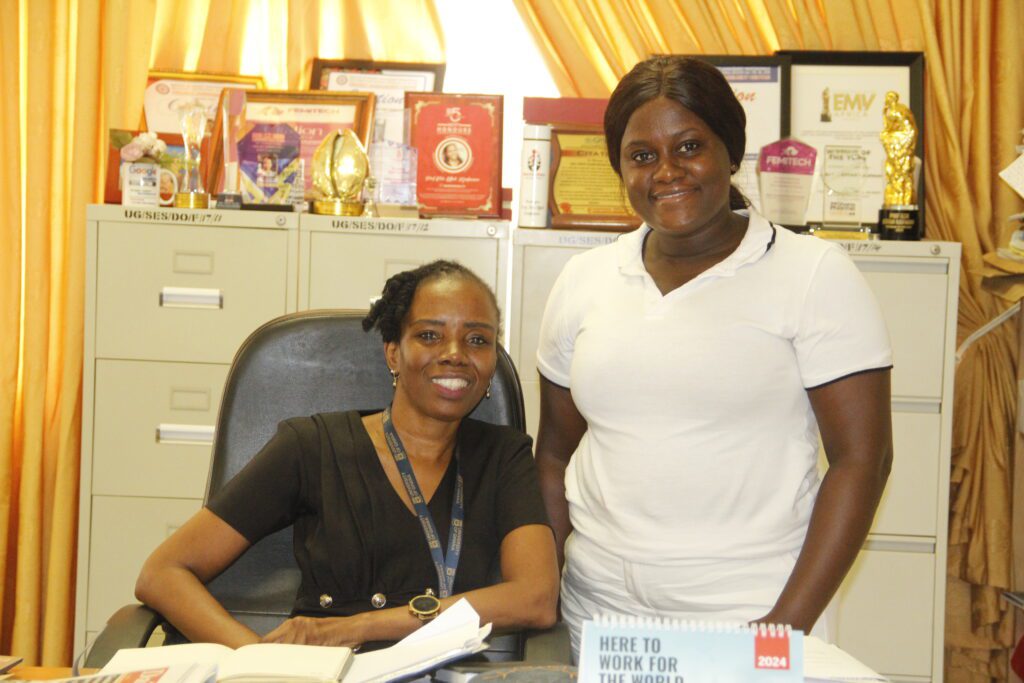
Prof. Elsie Effah Kaufmann (Left) and Journalist (Right)
Mentorship and Role Models
“It all started when I returned to Ghana in the year 2001 as a young lecturer employed by the University of Ghana to help start engineering” Prof. Effah Kaufmann explained that “my first appointment was to the Department of Physics where I was the first Ghanaian woman to have been appointed full-time. She added that, “When I got there, I seemed to be an anomaly. I was the only female on staff at the time and the students started looking at me strangely. I will be in my office and I am very open to the extent that I allow students enter my office freely. I will allow my door open and students will come in and ask, when can we see Dr. Kaufmann? Some will even ask me where they can find my father, because they assumed I was too young to be a lecturer and it was my father’s office I was occupying”.
She narrates how she would go to class to teach, and would find students and others peeping through the windows to find out if she is a lecturer or a student. But in all the classes she taught, she found very few women and as an engineer, she had to look for a solution and hence saw mentorship as a way to help bridge the gap of underrepresentation of women in science because women also need equal opportunities in these areas.
For, Prof. Effah Kaufmann, she’s into different kinds of mentoring. The unofficial, informal mentorship relationships with a wide range of individuals, young men and women and formal mentorship arrangements. She describes that she has peer mentors as well, her age mates. But she also undergoes mentorship, “I have mentors. Some of my mentors are Professor Isabella Ayinbah Quakyi, Professor Ivan Addae-Mensah, and Professor Christopher Charles Mate-Kole. These are the people that I will speak to about my problems and if I need advice” – she said. She also mentors’ different groups of people, from the basic school all the way up to the university and even beyond.
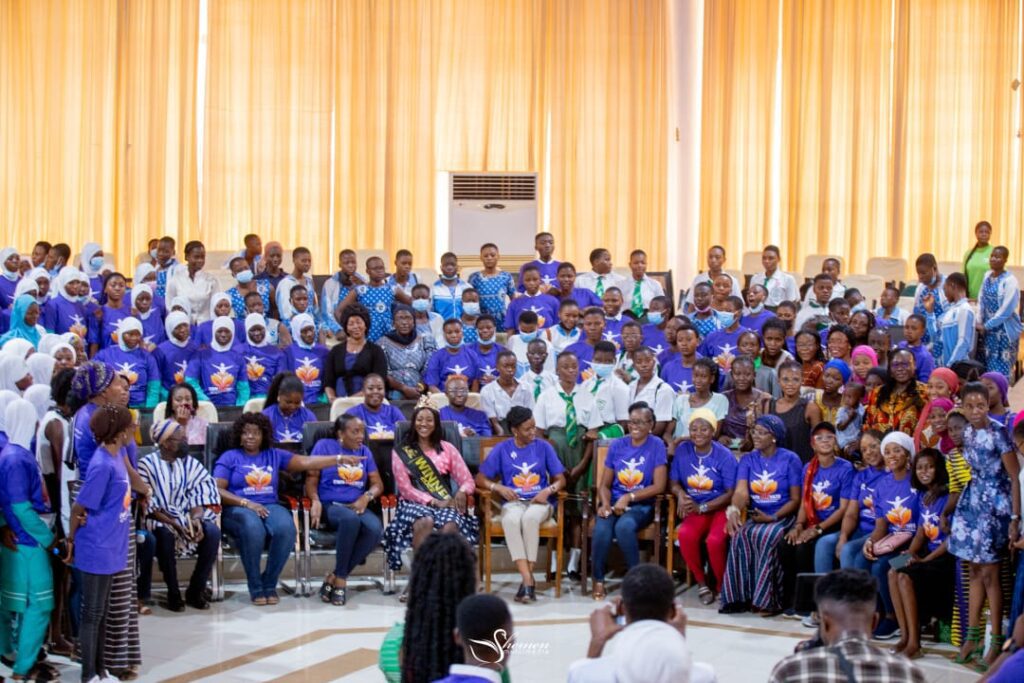
Prof. Effah Kaufmann with diverse group of students.
Addressing Unconscious Bias
In the beginning, there was very low female representation. Professor Elsie Akosua Biraa Effah Kaufmann explains that the young ladies were in the minority. To address this, she organizes and teaches them soft skills alongside technical skills. Additionally, she guides them on how to conduct themselves in a team, allowing them to have a say in choosing the team’s name, leaders, and secretaries. “In the beginning, it was always the young men who were the team leaders but now, there’s a difference. I see the young ladies standing up for themselves. They are actually team leaders these days, very powerful young ladies and they are doing well for themselves” – she said.
In comparison to their male peers, females are underrepresented in science and technology fields. A 2013 United Kingdom study explored that there has existed a persistent underrepresentation of women in STEM fields, and that in the prior 25-year period there had been little change of the participation of women in science and technology. Further, social barriers including the expectation of women in the home, early marriage and discriminatory practices in the labour market have been persistent in preventing women in developing regions across the world such as Africa, South Asia and the Caribbean from not only pursuing science and technology further, but education more broadly.
By resolution 70/212, passed on 22nd December 2015 and proclaimed as an annual commemoration of the observance day for the International Day of Women and Girls in Science serves as a crucial reminder of the immense contributions women and girls have made, and continue to make, in the fields of science, technology, engineering, and mathematics (STEM). Yet, the celebration also highlights the persistent gender gap that remains a reality in these fields.
Though the story of women in science being in smaller numbers globally, there has been remarkable strides in the pursuit of scientific advancements and innovation, women in Africa are challenging stereotypes, and breaking barriers in traditionally male-dominated fields. Despite facing numerous challenges, including societal norms, cultural expectations, and limited resources, these women are making significant contributions to Science, Technology, Engineering, and Mathematics (STEM) fields across the continent.
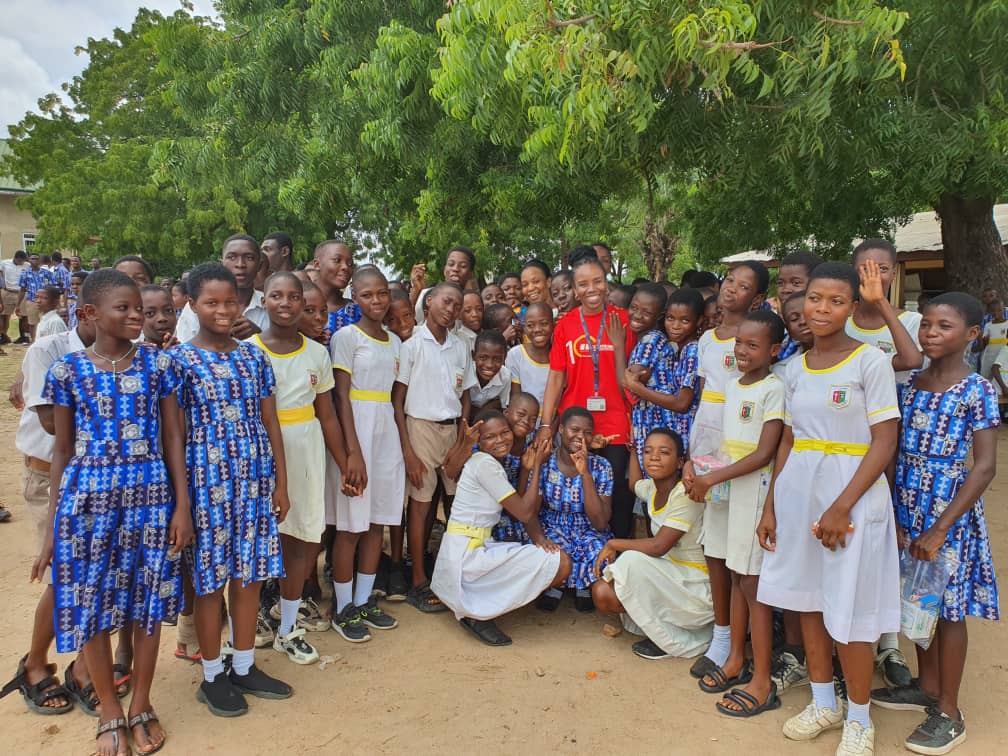
Prof. Effah Kaufmann (in red) after engaging with students.
Empowering Women in STEM
Across Africa especially Ghana, initiatives and organizations are actively working to empower women in STEM, providing mentorship, training, and opportunities for women to pursue careers in science. These efforts are intended to bridge the gender gap in STEM fields and unlocking the full potential of Africa’s scientific women and girls’ talent.
Numerous women in Africa are making waves in various scientific disciplines, from biology and chemistry to engineering and computer science. In Ghana, the late Professor Marian Ewurama Addy, a renowned biochemist, dedicated her career to advancing science education and research in Africa. Dr. Calestous Juma, a Kenyan-born professor at Harvard University, was a leading voice in African innovation and technology. Professor Francisca Nneka Okeke is a Nigerian Professor of Physics and the first female to head the Physical Sciences at the University of Nigeria. And the Restorers (Stacy Owino, Purity Achieng, Ivy Akinyi, Synthia Otieno and Macrine Atieno) five bright tech savvy young teens in Kenya who invented an app called iCut to help girls affected by Female Genital Mutilation in Kenya, connect them to legal and medical assistance and to restore hope to these girls.
Education and its significance
Education is often said to be the key to success. It does not only define one’s career path but also opens one up to the world. The Sustainable Development Goal (SDG) 4.3 emphasizes that by 2030, all nations must ensure equal access for all women and men to affordable and quality technical, vocational and tertiary education, including university. Goal 4 in its quest to promote equal access to quality education also states the need to “Build and upgrade education facilities that are child, disability and gender sensitive and provide safe, nonviolent, inclusive and effective learning environments for all”.
Journey into mentorship
Prof. Effah Kaufmann describes that mentorship has benefits it gives to both the mentee and the mentor. For the mentee. She explains that it helps them to skip steps. “Sometimes, it is better to learn by making our own mistakes but not all mistakes are necessary or to be repeated. So, if you have someone who has made the same mistake and has overcome, you skip 3 or 4 steps in your own personal life” – she said. And for mentors, it gives them the opportunity to learn from their mentees. “By helping somebody along, you learn a few things and it is an opportunity for self-reflection and also it helps you to make an input into someone’s life” – she narrated. She stated that, it is also another way of paying it forward by mentoring someone else. “You also get a chance to make an impact in the future because if your mentee does well, it is a sense of pride. It makes me so happy when my mentees send me messages about wonderful things they are doing or when they are being recognized for something” – she added.
At the School of Engineering Sciences, Prof. Effah Kaufmann has an outreach team which is responsible for going out to promote their programs and also receive people as they come from tertiary institutions or elsewhere, and they mentor them and speak to young people who are considering engineering. Aside that, she has a mentorship committee where she brings in resource persons to come and partner with her. “I also do the individual ones as well. I am a Ghana Science and Tech Explorer (GSTEP) mentor, where we inspire and empower the next generation of inventors” – she stated.
Professor told me she has no regrets. “I am very passionate about what I do. I am a proud engineer, and I am excited to be doing the things that I am doing” – she said.
But one would ask, are Professor Effah Kaufmann’s mentorships free or at a charge? “I have never charged anybody for mentoring” – she noted. But admonishes anyone considering her as her mentor to be ready with their goals, objectives, and aims for mentorship before approaching her.
Professor Effah Kaufmann advises that young women who are considering a career in the sciences, have made the right choice. “We are in the fourth industrial revolutions, and it is all about technology, digital tools, and moving into the next realm of artificial intelligence. The world is very exciting and much of it is underpinned by scientific discovery” – she describes. She then urges them to be very determined, focused, stimulate their goals and objectives, find a strong support system, a good mentor and have a thick skin. “A thick skin for survival” – she said.
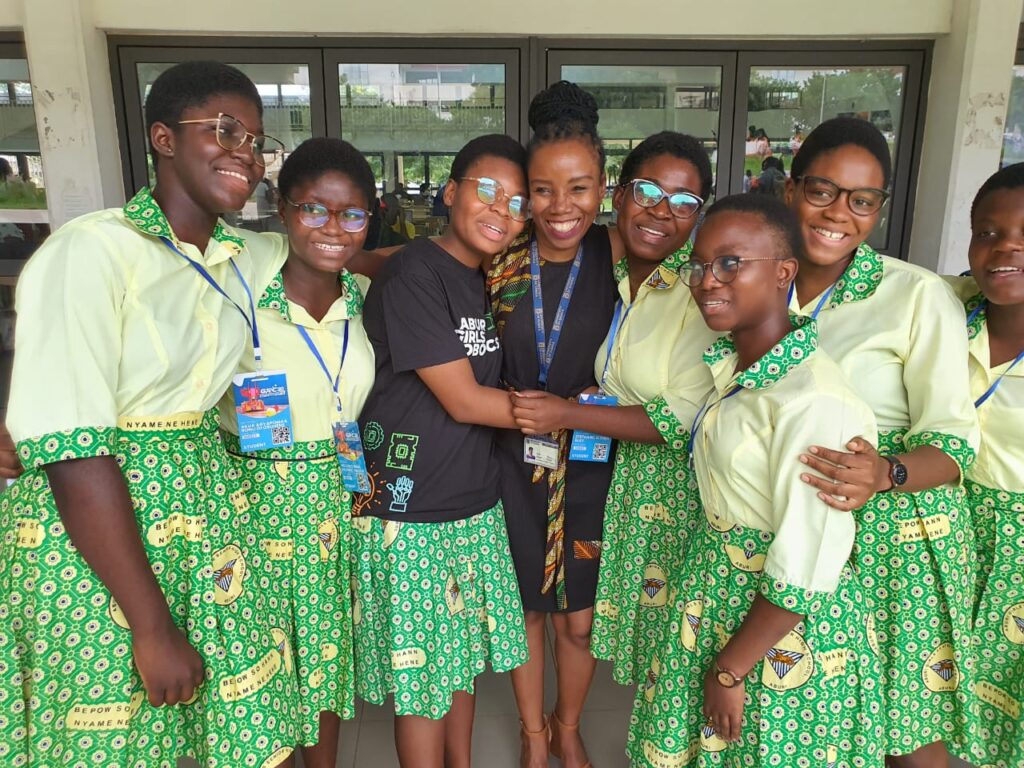
Prof. Effah Kaufmann (middle) after engaging with female students.
Conclusion
STEM is the key driving force in today’s economic development. It is through STEM that problem solving, and critical thinking skills are developed to tackle critical issues of environment, health, energy, security and agriculture. Women in science in Africa are playing a crucial role in driving innovation, fostering development, and shaping the future of the continent. Their contributions are invaluable, and their resilience in the face of challenges are inspiring.

Leave a Reply